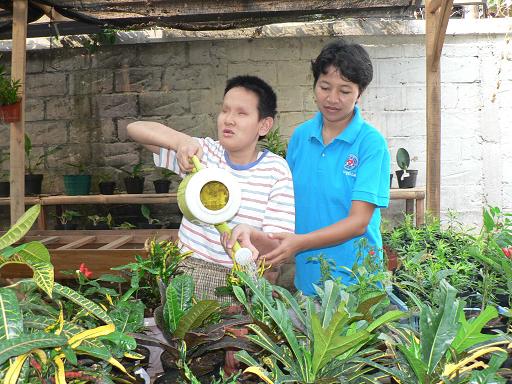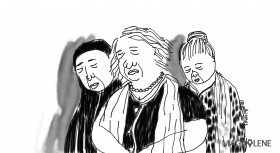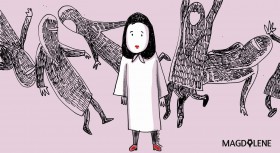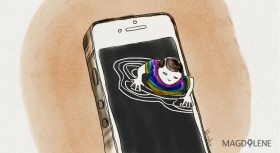Watching Murti, one of the adult students at Rawinala, perform a perfect drum solo with a big smile, I would never have guessed that the young lady was not only blind but also had multiple disabilities. Like dozens other students in the school, Murti seemed to be having a good time.
Located an hour south of Jakarta, the school prides itself for its mission to empower people with multiple disabilities, and to provide a place where they can be accepted.
Its slogan “to live to work to play to live” is apparent throughout the school, from the music rooms and the playground, to the swimming pool for rehabilitation. The passionate teachers and caregivers live by its motto “give your hand and heart to serve”, earning salaries that are based entirely on donations.
Founded in 1973 by a group of Java Christian Church (GKJ) community, the school currently has 56 students with multiple disabilities, including visual impairment, mental retardation, development disorder and hearing impairment. Asides from its school and training center, Rawinala, which means “light of the heart” in ancient Javanese, also has a dormitory and a home for adult people with disability.
It hasn’t always been easy for them. When the foundation opened another school for blind and deaf children just 12 kilometers away, it was met by an angry machete-wielding mob, who feared the children’s disabilities could be contagious in their community.
The school was forced to close down, and the foundation has since learned that an important part of their job is to educate the community as well, asides from the children.

In the last five years, Rawinala has received the support of Austraining International, a project management and international development organization, owned by the government of South Australia.
The need for growth, plus funding and education for staff at Rawinala is critical with an estimated 30,000 people in Jakarta with multiple disabilities and no other similar organisations in existence.
Rawinala can only host 56 people, mostly children. The severity of their disabilities prevents the organisation from increasing the ratio of students to teachers, which currently stands at one teacher per two students.
Recently, Austraining’s Board of Directors visited Rawinala, and Chairman John Bastian described it as one of the most memorable and rewarding visits he has had to a host organisation.
“On the one hand it was very confronting, but on the other you can see the wonderful progress the students are making with the help of their teachers, particularly as they are not getting significant help from any major overseas donor.”
While on their visit, the Austraining board felt it needed to do more to support Rawinala.
“We wanted to help in a very practical way. We were advised the old Braille machine was very old and out of date and we could help immediately by buying a new one,” Mr Bastian explains.
As part of the cooperation, a group of Australian Volunteers have also provided assistance to Rawinala.
Rawinala PR Manager Abel said the Australian volunteers helped Rawinala staff to be more efficient.
“We are the first MDVI (multiple disabilities and visually impaired) school in Indonesia. We don’t have anyone to look up to, we don’t have anyone helping us. Having volunteers from abroad helps us gain knowledge and pushes us to work harder and faster,” Abel said.
One of the volunteers, Andrew Neeson, spent 60 days at Rawinala to help develop its strategic plan.
Says Abel: “It helped us in so many ways; we are more organised. Andrew taught us that in order to accomplish our five-year plan, we needed to have smaller monthly plans.”
Leaving Rawinala, I see a group of women meticulously wrap stationary packs with beautiful paper and ribbon. Abel explains to me that they sometimes receive things they do not need, but instead of throwing the gifts away, they make presents for the children affected by the recent earthquakes in Indonesia.
And that’s just a glimpse into the huge hearts of the people who have so little but are willing to give so much.
About Sarah Bastian
Sarah is a student in journalism and international relations who wrote this article while interning for PT Austraining Nusantara.








Comments